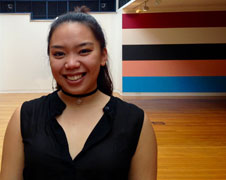

Simone Colson
Simone considers herself a “third-culture” kid who attended international schools in Malaysia, achieved her IB in Shanghai, and before studying at Otago worked in Auckland and travelled around Sweden and Switzerland.
Simone's love of biology and chemistry drew her to the University of Otago along with its reputable physiotherapy course. During her first year BIOC 192 really sparked her interest.
“After solidifying my decision of taking on Biochemistry, I thoroughly enjoyed understanding enzymatic structures and the ways in which they're affected under different conditions,” Simone says.
Simone found that as a biochemistry student you were encouraged to work independently, especially in the lab setting.
“Biochemistry definitely allowed us to have more independence when it came to working in a lab. Don't think I could ever forget the lab where we had to purify phycoerythrin,” she says.
Independent thinking is just one set of skills that Simone developed during her degree. She also credits being able to analyse and assess large data sets, manage pressure, and communicate with a wide range of people as giving her the ability to supervise and train monitoring officers at Environment Canterbury who are responsible for the resource management of water.
While she found aspects of biochemistry challenging, the department had processes and support in place to assist students to achieve.
“The most enjoyable part of biochemistry was the incredible teaching staff and lab demonstrators who composed a great support system for all of us when we were drowning in energy drinks,” she says.
With the support of the department, “this course taught me how to not crack under a great deal of pressure and developed my ability to be extremely critical of my work and the work of others. These skills will be essential in any job you come across.
“I have absolutely no regrets about studying biochemistry and encourage you to take it on,” Simone says.